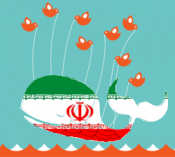 Even though Iran’s mobile phone infrastructure was crucial to the ability of Iranians to send to the outside world video, still images and first-hand reports of the events in Iran, Senators Chuck Schumer and Lindsey Graham think it’s a good idea to impose sanctions on two European companies that provided equipment used by Iran’s mobile phone infrastructure. The rush to pitchforks and torches was occasioned by a Wall Street Journal report earlier this week that revealed that Nokia Siemens Networks, a joint-venture of the German and Finnish telecom equipment giants, provided equipment that the Iranian government was using to monitor mobile telephone and Internet communications. A spokesman for the joint venture indicated that the technology provided to Iran was intended for lawful intercepts, a capability provided by the joint-venture and other companies to telcom providers around the world, including the United States. Lawful interception capacity is built into telcom networks to enable interception of communications relating to child pornography, drug trafficking, terrorism and other criminal activities.
Even though Iran’s mobile phone infrastructure was crucial to the ability of Iranians to send to the outside world video, still images and first-hand reports of the events in Iran, Senators Chuck Schumer and Lindsey Graham think it’s a good idea to impose sanctions on two European companies that provided equipment used by Iran’s mobile phone infrastructure. The rush to pitchforks and torches was occasioned by a Wall Street Journal report earlier this week that revealed that Nokia Siemens Networks, a joint-venture of the German and Finnish telecom equipment giants, provided equipment that the Iranian government was using to monitor mobile telephone and Internet communications. A spokesman for the joint venture indicated that the technology provided to Iran was intended for lawful intercepts, a capability provided by the joint-venture and other companies to telcom providers around the world, including the United States. Lawful interception capacity is built into telcom networks to enable interception of communications relating to child pornography, drug trafficking, terrorism and other criminal activities.
Schumer and Graham are proposing to introduce legislation tomorrow that would require U.S. government contractors that export “sensitive technologies” such as the intercept technology to Iran to terminate relationships with Iran before applying for new contracts or renewing existing contracts. The proposed legislation allows the President to waive the restrictions as long as the reasons for the waiver are reported to Congress. If, as Nokia Siemens Networks claims, the intercept capability is inherent in all networking equipment, the Graham-Schumer proposal could have the counterproductive effect of slowing the growth of Iran’s mobile telephone system. At this point, that would seem to benefit the currently embattled Iranian regime to the detriment of ordinary Iranians as well as dissidents in Iran seeking to communicate with the outside world.
Ironically, Schumer and Graham appear not to realize that they might do more for Iranian dissidents and the ordinary Iranian in the street by limiting sanctions rather than increasing them. As we noted in an earlier post, current sanctions, as interpreted by OFAC, arguably prohibit the provision of social networking and similar services, such as Twitter and Facebook, to Iranians, even though these services have been essential to allowing the flow of information from Iran to the rest of the world. More good could be done by legislation expanding and clarifying the information and telecommunications exception to make provision of Twitter, messaging-services, Facebook, YouTube and the like to private citizens in Iran clearly and unambiguously legal.
 Permalink
Permalink
Copyright © 2009 Clif Burns. All Rights Reserved.
(No republication, syndication or use permitted without my consent.)

 Posted by
Posted by  Category:
Category: 

